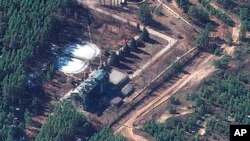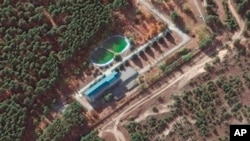Two weeks after Russia invaded Ukraine in February, Russian forces assaulted a nursing home in the eastern region of Luhansk. Dozens of elderly and disabled patients, many of them bedridden, were trapped inside.
The March 11 assault set off a fire that spread throughout the facility, suffocating people who couldn't move. A small number of patients and staff escaped and fled into a nearby forest, finally getting assistance after walking for 5 kilometers.
In a war awash in atrocities, the attack on the nursing home near the village of Stara Krasnyanka stood out for its cruelty. And Ukrainian authorities placed the fault squarely on Russian forces.
But a new U.N. report has found that Ukraine's armed forces bear a large, and perhaps equal, share of the blame for what happened in Stara Krasnyanka, which is about 580 kilometers southeast of Kyiv. A few days before the attack, Ukrainian soldiers took up positions inside the nursing home, effectively making the building a target.
At least 22 of the 71 patients survived the assault, but the exact number of people killed remains unknown, according to the United Nations.
The report by the U.N.'s Office of the High Commissioner for Human Rights doesn't conclude the Ukrainian soldiers, or the Russian troops committed a war crime. But it said the battle at the nursing home is emblematic of the human rights office's concerns over the potential use of "human shields" to prevent military operations in certain areas.
The aftermath of the attack on the Stara Krasnyanka home also provides a window into how both Russia and Ukraine move quickly to set the narrative for how events are unfolding on the ground — even when those events may still be shrouded by the fog of war.
Russia's frequently indiscriminate shelling of apartment buildings, hospitals, schools and theaters has been the primary cause of the war's thousands of civilian casualties. Ukraine and its allies, including the United States, have rebuked Moscow for the deaths and injuries and called for those responsible to be brought to justice.
But Ukraine also must abide by the international rules of the battlefield. David Crane, a former Defense Department official and a veteran of numerous international war crime investigations, said the Ukrainian forces may have violated the laws of armed conflict by not evacuating the nursing home's residents and staff.
"The bottom-line rule is that civilians cannot intentionally be targeted," Crane said. "The Ukrainians placed those people in a situation which was a killing zone. And you can't do that."
The first reports in the media about the Stara Krasnyanka nursing home largely reflected statements issued by Ukrainian officials more than a week after the fighting ended.
Serhiy Haidai, the governor of Luhansk, declared in a March 20 post to his Telegram account that 56 people had been killed "cynically and deliberately" by "Russian occupiers" who "shot at close range from a tank."
The Luhansk regional administration, which Haidai leads, did not respond to requests for comment. The Ukrainian prosecutor general's office did not directly respond to the U.N. report, but said it also is looking into whether Ukrainian troops had been in the home.
Moscow-backed separatists have been fighting Ukrainian forces for eight years in the mostly Russian-speaking Donbas, which includes the Luhansk and Donetsk regions. They have declared two independent "people's" republics, which were recognized by Russia just before the war began.
Viktoria Serdyukova, the human rights commissioner for the Luhansk separatist government, said in a March 23 statement that the Ukrainian troops were responsible for casualties at the nursing home. The residents had been taken hostage by Ukrainian "militants" and many of them were "burned alive" in a fire started by the Ukrainians as they were retreating, she said.
At the beginning of March, according to the U.N. report, "when active hostilities drew nearer to the care house," its management requested repeatedly that local authorities evacuate the residents. But an evacuation wasn't possible because Ukrainian forces were believed to have mined the surrounding area and blocked roads, the report said.
On March 7, Ukrainian soldiers entered the nursing home, according to the U.N. Two days later, they "engaged in an exchange of fire" with the Moscow-backed separatists, "although it remains unclear which side opened fire first," the report said.
On March 11, 71 residents and 15 staff remained in the home with no access to water or electricity. That morning, the Luhansk separatist forces, which the U.N. referred to as "Russian-affiliated armed groups," attacked with heavy weapons, the report said.
"A fire started and spread across the care house, while the fighting was ongoing," according to the U.N. An unspecified number of patients and staff fled the home and ran into a nearby forest and were eventually met by the separatist fighters, who gave them assistance, according to the U.N.
A correspondent for the state-owned Russia-1 news channel gained access to the war-ravaged home after the battle and posted a video to his Telegram account that accused Ukrainian soldiers of using "helpless old people" as human shields.
While the opposing sides blame each other for the Stara Krasnyanka tragedy, the grim reality is that much of the war in Ukraine is being fought in populated areas, increasing the potential for civilian casualties.





